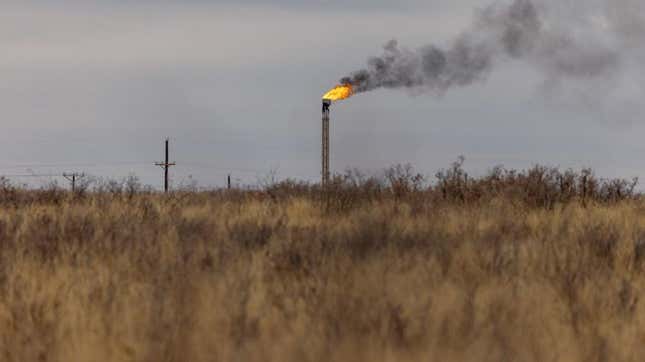
Texas will vote on whether to give the oil and gas industry billions to make its barely-working power grid more reliable while ignoring the benefits of renewable energy. This comes two years after a winter storm shut off power for millions of Texans, and a heat wave this past summer that pushed the power grid to its limits.
Texans will weigh in on Proposition 7 Tuesday, which is a constitutional amendment that if passed will give the state’s utility regulator the authority to give low-interest loans to either upgrade or build new natural gas power plants. These gas plants are intended to support Texas’ often faulty grid especially during extreme weather events.
If enough Texans vote for the proposition, it will enact Senate Bill 2627, a bill that authorizes the Public Utility Commission of Texas to create the “Texas Energy Fund,” the Houston Chronicle reported. The fund would amount to $10 billion in total.
About $5 billion of the fund will be allocated for 3% interest loans for constructing power plants that can generate more than 100 megawatts, according to a report from the Texas Tribune. More than a billion dollars will go toward completion bonuses for natural gas power plants. Once completed, these power plants can be switched on when the grid is stressed.
Language in the bill describes the facilities eligible for loans and grants from the fund as facilities that “can be controlled primarily by forces under human control.” This means coal-fired plants, nuclear plants, and natural gas plants. This would exclude renewable energy because the source of that energy depends on the weather.
Environmental groups outright oppose Prop 7. The Sierra Club explained that the language in the proposition downplays that “fossil fuel infrastructure was heavily to blame for the power outages during Winter Storm Uri,” in a statement from last month.
Another major concern from environmental groups comes from the source of natural gas. Sourcing natural gas releases methane into the atmosphere, which is a greenhouse gas 80 times more potent than carbon dioxide over a two-decade period. This will only contribute to the climate-related emergencies such as major storms and the sky-high temperatures that caused Texas’ grid to reach record usage multiple times this past summer.
“Our grid challenges in Texas are not the fault of solar and wind,” the Sierra Club’s statement said. “Our electricity demand is being fueled in large part by extreme temperatures driven by climate change–a slew of new gas plants will only make this problem worse.”
Luke Metzger, the executive director of Environment Texas, thinks that the painful memories from the 2021 storm are being weaponized so that Texans can be on board with more fossil fuel subsidies.
“Voters reading that will think ‘oh, this will help the grid. I’m still scared from Uri’” Metzger told Earther in a call. “There’s far better ways to spend $10 billion to boost reliability, including energy efficiency investments and batteries which are excluded from this program.”
Metzger also worries that this could drown out the progress that the state has made in producing renewable energy, which he said will be more cost-effective in the long run. Despite being a solid red state governed by fossil fuel-loving Greg Abbott, renewables are doing extremely well there. A study released earlier this year found that the U.S. saw impressive growth in wind and solar energy capacity, but Texas led the country in wind energy production. The state also came in second for solar energy production.
“I think [Prop 7] will have a deflating impact on that,” Metzger said. “If you are building new gas plants, that’s going to mean less demands for renewables that we might otherwise have seen.”
Want more climate and environment stories? Check out Earther’s guides to decarbonizing your home, divesting from fossil fuels, packing a disaster go bag, and overcoming climate dread. And don’t miss our coverage of the latest IEA report on clean energy, the future of carbon dioxide removal, and the invasive plants you should rip to shreds.